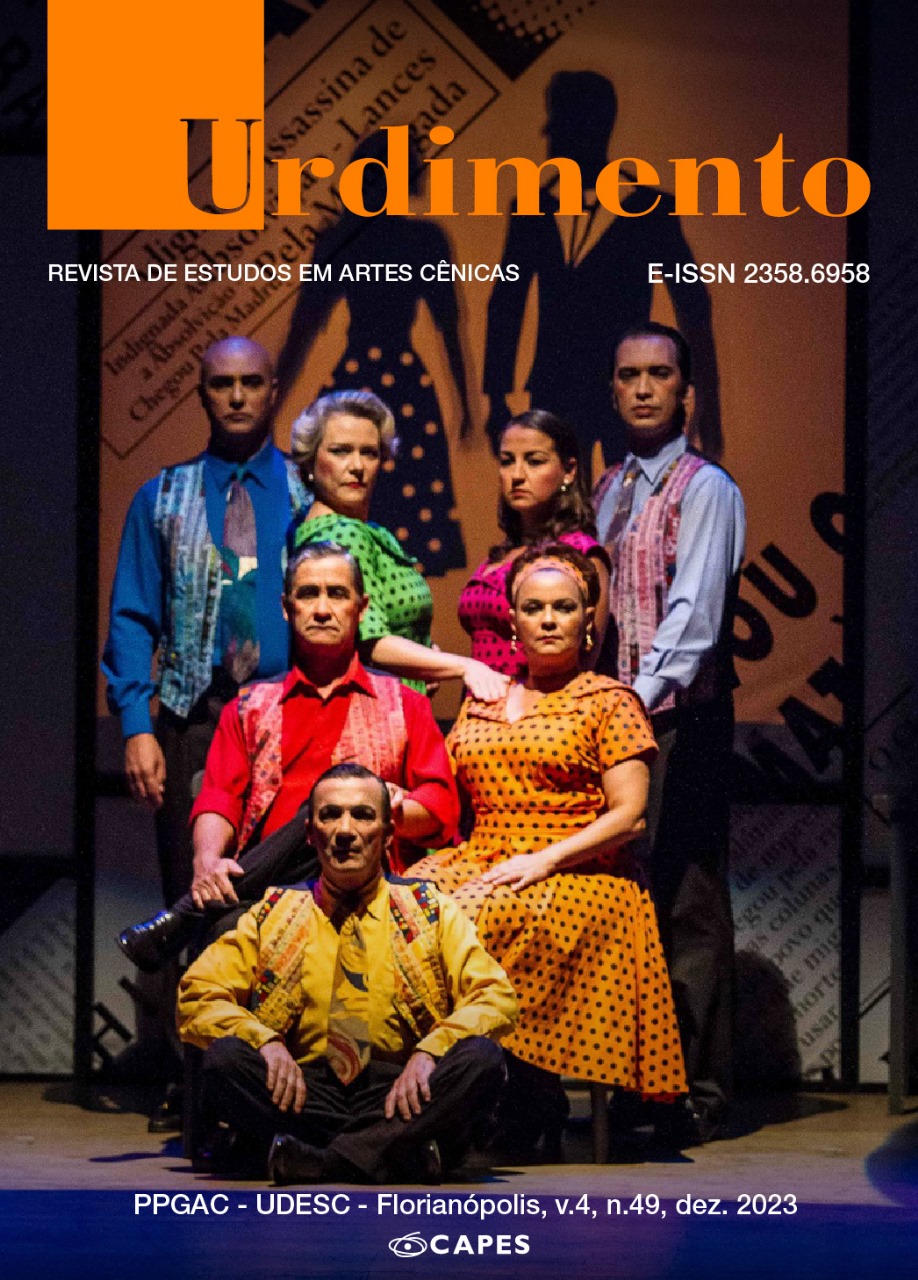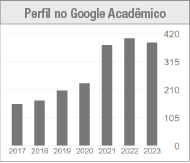An analysis of the dramaturgical devices in Clothes for a Summer Hotel by Tennessee Williams
DOI:
https://doi.org/10.5965/1414573104492023e0205Keywords:
dramaturgy, theatre, Tennessee Williams, social criticismAbstract
This article analyzed Tennessee Williams' Clothes for Summer Hotel – A Ghost Play, framing it as Pop Art dramaturgy. It explored the fragmentation of dialogues, actions, and the post-dramatic approach to time and space. It investigated these expressionist elements that reinforce its antirealistic character, challenging stigmas by portraying Zelda as a character transcending temporal reality, memory, and dream. Williams confronts dramatic narratives, providing an uncomfortable perspective to traditional standards of psychological realism associated with his work, offering an alternative interpretation.
Downloads
References
DORFF, Linda. Disfigured Stages: The Late Plays of Tennessee Williams, 1958-1983. Tese (Doctor of Philosophy). New York: University of New York, 1997.
KAPLAN, David. Mr. Williams Is Advised to Stay Silent. In: KAPLAN, D. (Ed.). Tenn at One Hundred: The Reputation of Tennessee Williams. Est Brunswick: Hansen Publishing Group, 2011. p. 182-207.
KERR, Walter. The Stage: ‘Clothes for a Summer Hotel’: People Out of Books. In: The New York Times, 27 mar. 1980. Disponível em: https://www.nytimes.com/1980/03/27/archives/the-stage-clothes-for-a-summer-hotel-people-out-of-books.html. Acesso: 05 jul. 2023.
KUHNS, David F. German Expressionist Theatre – The actor and the stage. Cambridge: Cambridge University Press, 1997.
LEHMANN, Hans-Thies. Teatro pós-dramático. Trad. Pedro Süssekind. São Paulo: Cosac & Naify, 2007.
LITTLE, Julianna. “Frailty, Thy Name Is Woman”: Depictions of Female Madness. Masters (Fine Arts). Theatre Pedagogy. Virginia Commonwealth University. Richmond, 2015. Disponível em: https://scholarscompass.vcu.edu/cgi/viewcontent.cgi?article=4744&context=etd Acesso: 06 Jul. 2023
LITTLE, Stuart W. Off-Broadway: The Prophetic Theater. New York: Coward, McCann & Geoghegan, INC, 1972.
PLAYBILL. Clothes for a Summer Hotel. Disponível em: https://playbill.com/personlistpage/person-list?production=00000150-aea2-d936-a7fd-eef6ec5e0002&type=cp#cc. Acesso: 6 out. 2023.
PORTER, Roy. Madness: A Brief Story. Oxford: Oxford University Press, 2003. 256 p.
PONTE, Durant da. Tennessee Williams´ Gallery of Feminine Characters. In: MARTIN, Robert A. Critical Essays on Tennessee Williams. New York: G. K. Hall & Co, 1997.
PROSSER, William. The Late Plays of Tennessee Williams. Maryland: Scarecrow Press, 2009.
SADDIK, Annete J. The Politics of Reputation – The Critical Reception of Tennessee Williams’ Later Plays. Cranbury: Associated University Presses, 1999.
SADDIK, Annete J. Tennessee Williams and the Theatre of Excess: The Strange, the Crazed, the Queer. Cambridge: Cambridge University Press, 2015.
TOLEDO, L. M. Arnaut de. Aimez-Vous Ionesco? e The Traveling Companion: A Dramaturgia Pop Art de Tennessee Williams. fólio - Revista de Letras, [S. l.], v. 14, n. 1, 2022. DOI: 10.22481/folio.v14i1.10962. Disponível em: https://periodicos2.uesb.br/index.php/folio/article/view/10962. Acesso em: 5 out. 2023.
WILLIAMS, Tennessee. A Streetcar Named Desire. New York: New Directions, 2004. E-book.
WILLIAMS, Tennessee. Camino Real. New York: New Directions, 2008. E-book.
WILLIAMS, Tennessee. Clothes for a Summer Hotel – A Ghost Play. New York: Dramatists Play Service, 1981.
WILLIAMS, Tennessee. Clothes for a Summer Hotel – A Ghost Play. New York: New Directions, 1983.
WILLIAMS, Tennessee. Tennessee Williams – New Selected Essays: Where I Live. John S. Bak (Ed.). New York: New Directions, 2009.
Published
How to Cite
Issue
Section
License
Copyright (c) 2023 Urdimento: Revista de Estudos em Artes Cênicas

This work is licensed under a Creative Commons Attribution 4.0 International License.
Copyright Statement
The articles published by the magazine are free to use. The copyright is all assigned to the magazine. The articles whose authors are identified represent the expression from the point of view of their authors and not the official position of the journal Urdimento. The author (s) undertakes whenever publishing material relating to the article published in Revista Urdimento mention the said publication as follows: This article was originally published by Urdimento magazine in its volume (put the volume), number (put the number) in the year of (put the year) and can be accessed at:
http://www.revistas.udesc.br/index.php/urdimento
This work is licensed under a Creative Commons Attribution 4.0 International License.




